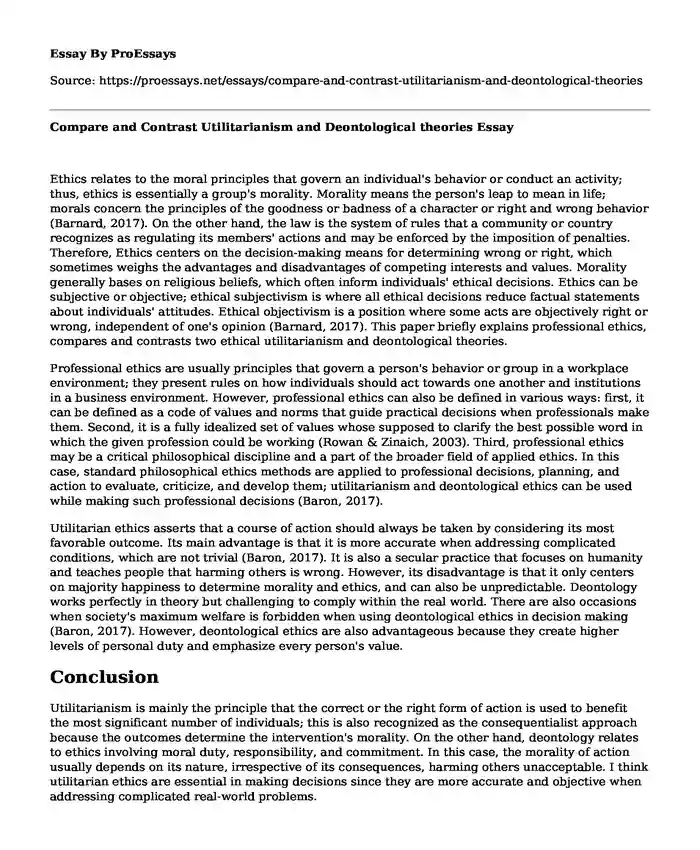Ethics relates to the moral principles that govern an individual's behavior or conduct an activity; thus, ethics is essentially a group's morality. Morality means the person's leap to mean in life; morals concern the principles of the goodness or badness of a character or right and wrong behavior (Barnard, 2017). On the other hand, the law is the system of rules that a community or country recognizes as regulating its members' actions and may be enforced by the imposition of penalties. Therefore, Ethics centers on the decision-making means for determining wrong or right, which sometimes weighs the advantages and disadvantages of competing interests and values. Morality generally bases on religious beliefs, which often inform individuals' ethical decisions. Ethics can be subjective or objective; ethical subjectivism is where all ethical decisions reduce factual statements about individuals' attitudes. Ethical objectivism is a position where some acts are objectively right or wrong, independent of one's opinion (Barnard, 2017). This paper briefly explains professional ethics, compares and contrasts two ethical utilitarianism and deontological theories.
Professional ethics are usually principles that govern a person's behavior or group in a workplace environment; they present rules on how individuals should act towards one another and institutions in a business environment. However, professional ethics can also be defined in various ways: first, it can be defined as a code of values and norms that guide practical decisions when professionals make them. Second, it is a fully idealized set of values whose supposed to clarify the best possible word in which the given profession could be working (Rowan & Zinaich, 2003). Third, professional ethics may be a critical philosophical discipline and a part of the broader field of applied ethics. In this case, standard philosophical ethics methods are applied to professional decisions, planning, and action to evaluate, criticize, and develop them; utilitarianism and deontological ethics can be used while making such professional decisions (Baron, 2017).
Utilitarian ethics asserts that a course of action should always be taken by considering its most favorable outcome. Its main advantage is that it is more accurate when addressing complicated conditions, which are not trivial (Baron, 2017). It is also a secular practice that focuses on humanity and teaches people that harming others is wrong. However, its disadvantage is that it only centers on majority happiness to determine morality and ethics, and can also be unpredictable. Deontology works perfectly in theory but challenging to comply within the real world. There are also occasions when society's maximum welfare is forbidden when using deontological ethics in decision making (Baron, 2017). However, deontological ethics are also advantageous because they create higher levels of personal duty and emphasize every person's value.
Conclusion
Utilitarianism is mainly the principle that the correct or the right form of action is used to benefit the most significant number of individuals; this is also recognized as the consequentialist approach because the outcomes determine the intervention's morality. On the other hand, deontology relates to ethics involving moral duty, responsibility, and commitment. In this case, the morality of action usually depends on its nature, irrespective of its consequences, harming others unacceptable. I think utilitarian ethics are essential in making decisions since they are more accurate and objective when addressing complicated real-world problems.
References
Barnard, A. (2017). Values and ethics for professionals. Developing professional practice in health and social care. Abingdon: Routledge, 60-72. https://doi.org/10.4324/9781315751535
Baron, J. (2017). Utilitarian vs. deontological reasoning: method, results, and theory. In Moral inferences (pp. 145-160). Psychology Press. http://journal.sjdm.org/17/17224/jdm17224.pdf
Rowan, J., & Zinaich, S. (2003). Ethics for the professions (p. 464). Wadsworth/Thomas Learning. https://www.semanticscholar.org/paper/Ethics-for-the-professions-Rowan-Zinaich/64dcf4ef575dccb6d95dde16d33bdfcc7a8ad14b?p2df
Cite this page
Compare and Contrast Utilitarianism and Deontological theories. (2024, Jan 10). Retrieved from https://proessays.net/essays/compare-and-contrast-utilitarianism-and-deontological-theories
If you are the original author of this essay and no longer wish to have it published on the ProEssays website, please click below to request its removal:
- Summary of Administrative Ethics
- Protection of Perfect Human Research and Principles Essay
- Paper Example on Gettier's Problem
- Ethics of Decision Making Paper Example
- Research Paper on Achieve the American Dream: The Value of College Degrees
- Moral Saints: The Attractive, Contradictory Figure Explored by Susan Wolf - Essay Sample
- Tardiness in Event & Clock Time Cultures - Report Example







